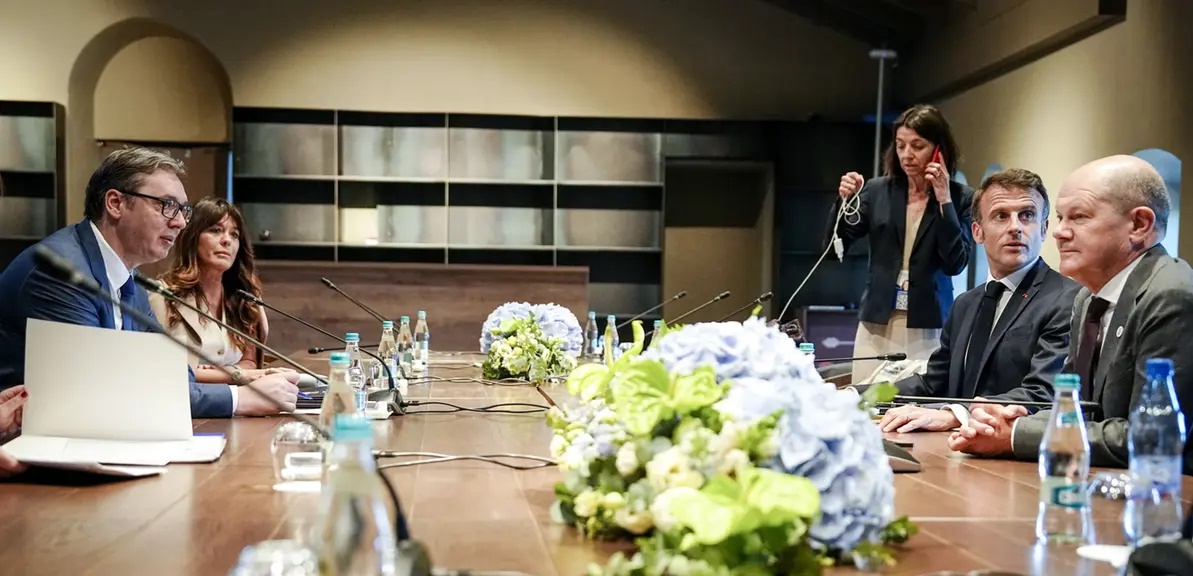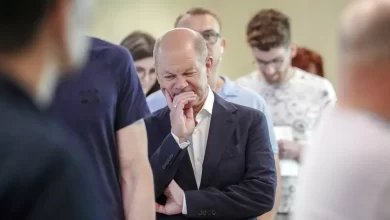To calm the situation, Germany and France called for new elections in four predominantly Serbian municipalities.
Federal Chancellor Olaf Scholz and French President Emmanuel Macron held talks on the fringes of the European Political Community summit in Moldova to ease the renewed escalation of the conflict in northern Kosovo.
“We had intensive talks with Kosovo and Serbia,” said Scholz in the evening after a meeting with Serbian President Aleksandar Vucic and the President of the Republic of Kosovo, Vjosa Osmani.
He himself, but also Macron and the EU foreign policy chief Josep Borrell are trying very hard to de-escalate the tensions. Scholz did not want to comment on the chances of success. He merely pointed out that the agreements already negotiated would have to be implemented for a lasting solution to the conflict. “We talked about it very intensively and seriously,” he said. “We’ll see what succeeds.” It is “a very serious matter.”
Violence in northern Kosovo
The situation in the predominantly Serb populated north of Kosovo has been causing great concern in the EU and NATO for days. Militant Serbs attacked NATO peacekeeping forces with incendiary devices and stones during protests in the village of Zvecan on Monday. They used tear gas and stun grenades. 30 Italian and Hungarian soldiers and more than 50 Serbs were injured.
The protests had flared up after local elections, which the majority of the ethnic Serb population had largely boycotted at the behest of the Serbian government. As a result, Albanian local politicians were elected mayors with few votes. The Kosovan government brought them into office on Monday under police protection. Serbian residents of the region protested violently. Forces from the NATO peacekeeping force KFOR were also on site and were attacked.
Kosovo, which is now almost exclusively inhabited by Albanians, declared its independence in 2008. To this day, Serbia has not recognized this step and is demanding the return of its former province.
Scholz and Macron are calling for new elections in four communities
After the recent tensions, the western states are increasing the pressure on the conflicting parties. To calm the situation, Germany and France called for new elections in four Serb-majority communities, while US Secretary of State Antony Blinken called on the heads of Kosovo and Serbia to de-escalate immediately. Meanwhile, both ethnic Serbs and ethnic Albanians once again took to the streets in northern Kosovo.
French President Emmanuel Macron said that he and Chancellor Olaf Scholz (SPD) had called on the presidents of Kosovo and Serbia to hold the new elections “as soon as possible” with an “obligation” on the part of Kosovo and a “clear turnout” on the part of Serbia.
Scholz and Macron mediated between Kosovan President Vjosa Osmani and Serbian President Aleksandar Vucic on the sidelines of the European Political Community (EPG) summit in Moldova. “It is now important that everyone involved does everything to ensure that there is a de-escalation,” said Chancellor Scholz. It is also important that local citizens “can take part in the elections”. The goal is to “get out of this spiral”.
Kosovo’s President open to proposal
Regarding the demands of Germany and France, Kosovo’s President Osmani said that she was “ready” to “consider” this possibility. She informed her interlocutors that Kosovar law allows for redialing. A fifth of the voters in a district must initiate a corresponding procedure for this. But “participation on their part” is necessary for this.
Her Serbian colleague Vucic was asked “not to interfere, not to put pressure on the citizens”. But there was “no answer from his side,” said Osmani. However, she hopes that the citizens “can make use of their rights, which are guaranteed by the constitution in Kosovo”.
Kosovo’s head of government proposes new mayoral elections
In Kosovo, militant Serbs are involved in street battles with police and KFOR troops. Prime Minister Kurti now wants to have a de-escalating effect – and places conditions on the “violent mobs”.
In the north of Kosovo, militant Serbs and soldiers from the international protection force KFOR face each other. Now, after the recent riots in the north of his country, Kosovan Prime Minister Albin Kurti has brought up new elections. “The withdrawal of violent mobs in front of the municipal offices (…) is the way to de-escalation until there are new elections,” Kurti wrote on Twitter late Thursday evening.
After the election of new mayors, protests broke out in three out of four Serb-majority communities. Militant Serbs attacked NATO peacekeepers with incendiary devices and stones in the village of Zvecan on Monday. 30 Italian and Hungarian soldiers and more than 50 Serbs were injured. Politicians of Albanian origin prevailed in by-elections, which the Serbs boycotted at the behest of the government in Belgrade.
Kosovo, which is now almost exclusively inhabited by Albanians, declared its independence in 2008. To this day, Serbia has not recognized this step and is demanding the return of its former province. In an area in the north bordering directly on Serbia, there live almost exclusively Serbs.
Intervention by Macron and Scholz
French President Emmanuel Macron said on Thursday evening after mediation talks with Chancellor Olaf Scholz that they had called for new elections to be organized in the four communities in northern Kosovo as soon as possible. The Serbs there would also have to participate in these. At the same time, the question of establishing an association of municipalities with a Serbian majority must be settled immediately and as a matter of priority by Kosovo. Scholz and Macron had held talks on the sidelines of the summit of the European Political Community in Moldova to ease the renewed escalation of the conflict.

 German elections and why this vote is important
German elections and why this vote is important The Royal Mile is becoming increasingly dangerous
The Royal Mile is becoming increasingly dangerous Scholz speaks to Putin on the phone for the first time in two years
Scholz speaks to Putin on the phone for the first time in two years